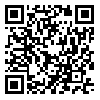BibTeX | RIS | EndNote | Medlars | ProCite | Reference Manager | RefWorks
Send citation to:
URL: http://salmandj.uswr.ac.ir/article-1-623-en.html
2- Department of Epidemiology and Biostatistics, School of Public Health, Tehran University of Medical Sciences, Tehran, Iran
3- Department of Nutrition and Biochemistry, School of Public Health, Tehran University of Medical Sciences, Tehran, Iran. ,
Objectives: The present study aimed to assess elderly “healthy eating diet” -2005 (HED-2005) quality and its relationship to their socio-demographic variables in healthy subjects aged 60 years and over who live in the urban areas of Iran`s Markazi province.
Methods & Materials: This study was a descriptive-analytic survey that included 165 elderly in the urban areas of Iran`s Markazi province. Data were obtained via a general questionnaire and three 24-hours recalls.
Results: The mean of overall HEI-2005 was 54.08. Ninty-three point three percent (93.3%) of subjects consumed grains, 70.9% fruits, 84.2% whole fruit, 47.9% vegetables, 12.7% dark-orange vegetables and legumes, 37% dairy products, 40% meats, 18.8% oils, 40% saturated fats, 1.8% sodium and 1.2% discretionary calories (from solid fat and added sugar) in optimal levels. Besides, none of the elderly people had a sufficient intake of whole grains. The HEI-2005 total score enhanced along with the increases in education level (P<0.05), income (P<0.01) and TV watching time (P<0.05). But, age and the HEI-2005 total score had an inverse relationship (P<0.001).
Conclusion: Because the diet quality of elderly people in the urban areas of Iran`s Markazi province is low, they will benefit from the improvement of their diet quality. Also, they need to increase intakes of whole grains, dark-orange vegetables and legumes and plant oils, and reduce intakes of sodium and their energy levels from saturated fat and simple sugar. It should be pointed out that the government can help with the achievement of these objectives through some plans such as promoting their literacy level, income and nutritional knowledge.
Received: 2012/03/12 | Accepted: 2012/05/25 | Published: 2012/07/01
| Rights and permissions | |
 |
This work is licensed under a Creative Commons Attribution-NonCommercial 4.0 International License. |





